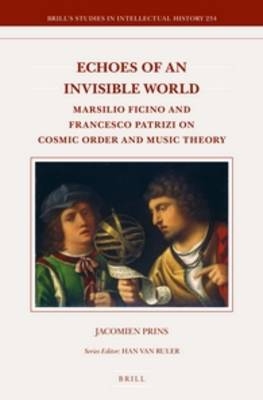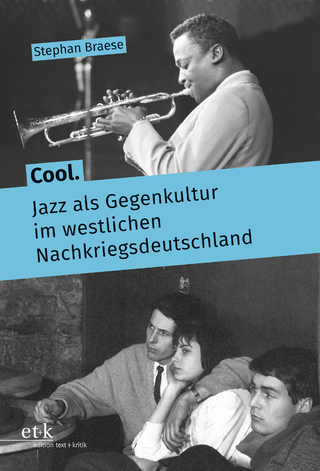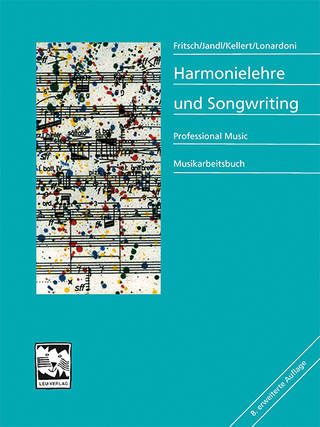
Echoes of an Invisible World
Brill (Verlag)
978-90-04-27437-2 (ISBN)
In Echoes of an Invisible World Jacomien Prins offers an account of the transformation of the notion of Pythagorean world harmony during the Renaissance and the role of the Italian philosophers Marsilio Ficino (1433-1499) and Francesco Patrizi (1529-1597) in redefining the relationship between cosmic order and music theory. By concentrating on Ficino’s and Patrizi’s work, the book chronicles the emergence of a new musical reality between the fifteenth and sixteenth centuries, a reality in which beauty and the complementary idea of celestial harmony were gradually replaced by concepts of expressivity and emotion, that is to say, by a form of idealism that was ontologically more subjective than the original Pythagorean and Platonic metaphysics.
Jacomien Prins, Ph.D., University of Warwick, is a global research fellow at the IAS (Institute of Advanced Study) and CSR (Centre for the Study of the Renaissance) at that university. She has published many articles and a volume (Harmonious labyrinth) on the Pythagorean tradition of world harmony.
List of figures, music examples, and tables
Preface
Chapter 1. Introduction
1. Nature and scope of the book
2. The tradition of the harmony of the spheres
3. Status quaestionis
4. Methodology
5. Structure of the book
PART ONE. MARSILIO FICINO (1433-1499)
Chapter 2. The universe as a musical creation
1. Introduction
2. The Timaeus as a source of perennial harmonic wisdom
2.1. Prisca theologia
2.2. A hymn to the Creator of the cosmos
3. A divine geometrical method for a philosophy of nature
3.1. The divine Composer-Architect as First Cause of the universe
3.2. Seven cosmic principles
3.3. Number over matter
4. Cosmic harmony in terms of the four mathematical disciplines
4.1. Arithmetic: Numbers bridging the conceptual and the physical world
4.2. Music: Harmonies as intermediaries between the intelligible and the sensible realm
4.3. Geometry: Cosmic harmony expressed in terms of continuous quantity
4.4. Astronomy: The planetary spheres as harmonic forms in motion
5. A fifteenth-century dynamic interpretation of the music of the spheres
5.1. The harmonic structure of the World-Soul
5.2. Four cosmic harmonizing powers
5.3. A magical-astrological interpretation of the music of the spheres
6. Conclusion
Chapter 3. Man as a co-creator of his harmonic nature
1. Introduction
2. Man as a harmonic microcosm
2.1. Man made in the image and likeness of God
2.2. Musical creativity
3. Contemplative ascents
3.1. The transmigration of the human soul: a true and likely story
3.2. The soul’s journey through the heavenly spheres
4. A fifteenth-century dynamic interpretation of musica humana
4.1. The harmonic structure of the human body and soul
4.2. A scientific model of the sense of hearing
5. Music’s power to shape and condition the human body and soul
5.1. Music as medicine
5.2. Therapeutic planetary music
6. Conclusion
PART TWO. FRANCESCO PATRIZI (1529-1597)
Chapter 4. From the music of the spheres to the mathematization of space
1. Introduction
2. The reception of Ficino’s interpretation of the notion of Pythagorean world harmony
2.1. An elaboration of the myth of the prisca theologia
2.2. Critique of Ficino’s interpretation of the harmony of the spheres
3. A revision of the traditional theory of the four mathematical disciplines
3.1. Questioning the primacy of number
3.2. The universe is not ordered by numerical ratios that produce musical consonances
3.3. A new geometry
3.4. The harmony of the spheres as remedy for astronomical chaos
4. A sixteenth-century interpretation of the harmony of the spheres
4.1. The harmonic structure of the World-Soul
4.2. Harmonizing powers explaining cosmic motion and dynamic interplay
4.3. A debate with a member of the Index of Forbidden Books on the harmonic design of God’s creation
5. Conclusion
Chapter 5. Man’s nostalgia for a lost musical paradise
1. Introduction
2. Questioning the belief in a harmonic design of the human soul
2.1. Critique of Ficino’s Eros doctrine
2.2. Man: just a special kind of animal or made in the image and likeness of God?
2.3. Changes in the relationship between the intellect and the sense of hearing
3. A transformation of music from mathematical science into rhetorical art
3.1. The musical foundations of human and animal speech
3.2. Towards a new musical semantics modelled after ancient Greek music
4. A musical expression of the ineffable
4.1. Critique of Aristotle’s theory of imitation
4.2. The marvellous as the basis for a new theory of musical magic
4.3. The harmony of the spheres as experience of the musical sublime
5. Conclusion
Chapter 6. Conclusion
6.1. The rediscovery of ‘new’ ancient sources belonging to the tradition of the harmony of the spheres
6.2. The development of new methodologies
6.3. Intellectual history from an interdisciplinary perspective
Select Bibliography
Index
| Erscheint lt. Verlag | 28.11.2014 |
|---|---|
| Reihe/Serie | Brill's Studies in Intellectual History ; 234 |
| Zusatzinfo | 3 Tables, black and white; 29 Illustrations, black and white |
| Verlagsort | Leiden |
| Sprache | englisch |
| Maße | 155 x 235 mm |
| Gewicht | 851 g |
| Themenwelt | Kunst / Musik / Theater ► Musik ► Musiktheorie / Musiklehre |
| Geisteswissenschaften ► Geschichte ► Regional- / Ländergeschichte | |
| Sozialwissenschaften | |
| ISBN-10 | 90-04-27437-5 / 9004274375 |
| ISBN-13 | 978-90-04-27437-2 / 9789004274372 |
| Zustand | Neuware |
| Haben Sie eine Frage zum Produkt? |
aus dem Bereich


